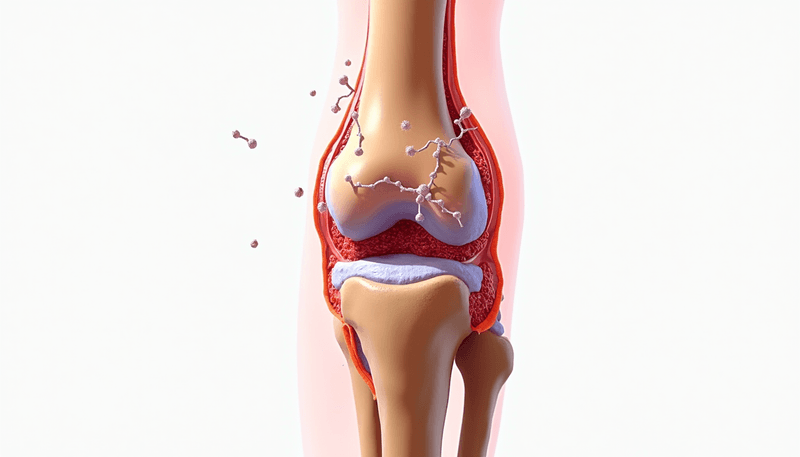Arthritis Risk Rises During Menopause

That sharp twinge in your knee as you climb stairs. The morning stiffness in your fingers that makes buttoning your shirt a challenge. If you're experiencing these symptoms during your menopausal transition, you're not alone. New research reveals striking connections between menopause and increased arthritis risk, with nearly half of women in the study developing rheumatoid arthritis during this life phase.
The Menopause-Arthritis Connection: Understanding Your Risk
The research findings paint a clear picture: women going through menopause face a significantly higher risk of developing arthritis, particularly rheumatoid arthritis (47.3%) and osteoarthritis (37.3%). But why does this happen? The answer lies in the complex interplay between hormonal changes and inflammation.
Have you noticed increased joint pain since entering perimenopause?
During menopause, estrogen levels decline dramatically. This hormone doesn't just regulate your reproductive system - it also helps protect your joints and keep inflammation in check. Think of estrogen as your body's natural anti-inflammatory shield. When that shield weakens during menopause, your joints become more vulnerable to inflammation and damage.
Hidden Warning Signs in Your Blood Work
One of the most fascinating aspects of this research is how regular blood tests can reveal your arthritis risk before severe symptoms appear. The study identified several key markers:
- Low hemoglobin levels (average 11.90 g/dL)
- Elevated cholesterol (246.97 mg/dL)
- Higher than normal blood sugar (121.32 mg/dL)
- Increased inflammatory markers (CRP and ESR)
Think of these blood markers as your body's warning lights - similar to the dashboard indicators in your car. Just as you wouldn't ignore a flashing check engine light, paying attention to these biological signals can help you take preventive action.
When was the last time you had a comprehensive blood workup?
Weight Management: A Powerful Tool Against Arthritis
The research highlighted a startling statistic: 52% of women with arthritis were classified as obese. This isn't just about numbers on a scale - each extra pound puts additional stress on your joints. Imagine carrying a 10-pound bag of groceries everywhere you go. Now imagine that weight pressing constantly on your knees and hips.
Here's what you can do:
- Focus on low-impact exercises like swimming or cycling
- Add strength training to support joint stability
- Choose anti-inflammatory foods like leafy greens and fatty fish
- Stay hydrated - your joints need water too!
Taking Action: Your Personal Prevention Plan
Based on the research findings, here's a practical approach to protecting your joint health during menopause:
-
Schedule Regular Check-ups
- Request comprehensive blood work annually
- Monitor inflammatory markers (CRP, ESR)
- Track vitamin D and calcium levels
-
Movement Medicine
- Start with 10-minute walking sessions
- Practice gentle yoga or tai chi
- Focus on range-of-motion exercises
-
Nutrition Strategy
- Increase omega-3 rich foods
- Reduce processed foods
- Consider calcium and vitamin D supplements (after consulting your healthcare provider)
As a woman who has navigated both personal and professional aspects of health transitions, I understand the anxiety that can come with these changes. But knowledge is power, and early awareness can make a significant difference in your joint health journey.
What one step will you take this week to protect your joint health?
Your menopause journey doesn't have to include debilitating joint pain. Start with one small change today - whether it's adding an anti-inflammatory food to your diet or scheduling that overdue check-up. Your future self will thank you for taking action now.
The research discussed in this post involved 300 women aged 40 and above, providing valuable insights into the connection between menopause and arthritis. While the study was conducted in Pakistan, its findings align with global research on women's health during menopause.
Key Takeaway: Early detection through regular blood work, maintaining a healthy weight, and staying active can significantly impact your joint health during menopause. Don't wait for severe symptoms to appear - start your prevention plan today.

Amelia Grace Okonkwo
Amelia Grace Okonkwo is a freelance health writer and author with over 15 years of experience in health journalism, specializing in women's health and autoimmune disorders. With a background in biology and a Master’s in Public Health from Johns Hopkins, she combines scientific accuracy with a storytelling approach to make health information accessible and empowering. Amelia is known for her bestselling book, "The Skin We're In," which explores autoimmune disorders and their impact. She is passionate about delivering practical health insights for women, addressing topics from midlife wellness to mental health.






